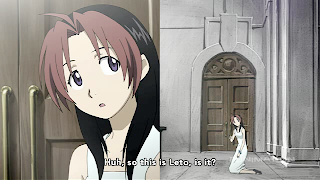Ani-Gamers staff writer Ink contributes a weekly column in which he examines the difference between the original Fullmetal Alchemist and its re-telling, Fullmetal Alchemist: Brotherhood. (We will finally be caught up with FUNimation’s release as of next weekend.) To read previous entries, click here.
Watch Episode 3 – City of Heresy on FUNimation.com!
Since “City of Heresy” covers FMA1 episodes 1 and 2 (nearly completely and chronologically), I’ll merely cover story arc differences and their implications. Starting off, this episode covers 2 episodes of FMA1; expect compression.
To start off, according to FMA2, the common townsfolk have heard former knowledge of the Elric brothers, contrary to FMA1, where the only being with such insight is a mysterious hooded lady (Lust). Also of note, a nifty-looking, very visually effective background on Cornello is made to introduce his character and also ends up more intelligently showing/explaining his “miraculous works.” Also of note, however, is the lack of emphasis on the debt the people of Liore owe Cornello for “reviving” their town throughout the episode.
Faith in women’s adeptness at science takes a hit with FMA2, as seen in a scene, funny as it is, that depicts Rose being dumbfounded upon hearing Ed’s chemical breakdown of the human body. As the setting for this scene, the main altar is noticeably brighter instead of seeming like a basement cult. This is more realistic, but it foreshadows to a lesser degree (if at all), romantically, the mood of the situation. There is also an allusion to Icarus and his father here, made by Ed during his Alchemists vs. God speech, which is quite impressive, although FMA1’s scientific simile of the sun as “a mass of Hydrogen” was equally effective. This fundamental difference is related in other ways as well, most notably by the omission of the Al vs. Ed discrepancy in terms of faith in people vs. possibility.
Appropriately enough to the structure of FMA2, but still contrary to FMA1, is the fact that Cornello’s men (specifically the assistant pastor, FMA1’s Cray) are in on “the plan.” This leads into a slight reworking of the ambush in the basement, which offers a very interesting, active role for Rose. Also herein, Cornello does not admit to having the Philosopher Stone, as opposed to FMA1, where it is explained away as a gift from the sun god. In FMA2, he claims it instead to be an ordinary ring, an explanation that plays on the manipulative soul he is. With regards to the action in the scene, there is an excellent rendition of the fight between the chimera and Ed which seemed more graphic and to have a lot more punch than FMA1 (though admittedly the FMA1 dub had the better lines). This scene also has Al protecting Rose as a shield in Cornello’s attack against Ed, which serves to show Cornello’s heartlessness but negates the more effective, omitted scene of Al saving Rose in her abandonment by Cornello later on that was included in FMA1.
Afterwards, there is an extended expository dialog between Al and Rose concerning the motives behind the brothers’ taboo. This lays everything flat in FMA2 instead of portraying the sense of shame and emotional pain that FMA1 accomplishes so well via careful and purposeful omission. Thus this scene feels almost robotic and definitely less ambiguous and dark than FMA1.
There are also differences with Ed and Al’s exit from the battle with Cornello, including Ed’s capture after his clever ruse of Al’s death in FMA1. Instead, FMA2 has Ed split with Al after escaping and use Cornello’s office microphone, which is small but important because the brothers are working more separately than as a team, though it does highlight Ed’s advantageousness.
Speaking of Ed, his final battle with Cornello doesn’t take place in front of the people of Liore, but it does come with a Level 2-boss-stage Cornello. Afterward, there is a brilliant (if only somewhat cliche) reprise of Rose’s active role as cloaked in an atmosphere of desperation. After the fight, there is an excellently violent ending involving Cornello, Lust, and Gluttony. Sadly, Envy and her specialty are not introduced. Also omitted in the episode was FMA1’s subplot of Cornello’s manipulating Rose by trying to revive her dead boyfriend, leaving a subtle emphasis and personal attachment somewhat lacking in terms of the nature of Ed and Al vs. those they come in contact with (namely Rose, but also any viewer who’s lost someone near-and-dear to themselves).
Judgement: I am thoroughly open to loving this new series and am doing so thus far. However, based on the characteristics brought forth to date, I’d have to say FMA1 does a heck of a lot better job in telling a deeper story. I hope to be proven wrong in the long-term, though, as this is, after all, only the third installment on a journey that will take well over a year to take in.

